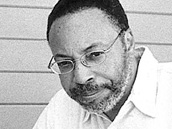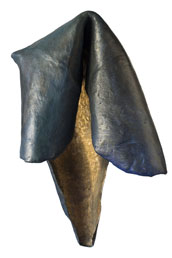Pages: 1 2 3 4 5 6 7 8 9 10 11 12 13 14 15 16 17
Heller, Holt, & Howe
Anyone who deems self-published poetry egotistical trash needs to pick up anything by Romantic poet William Blake: Some ego! Some trash! To survive our time of fiscal and intellectual deficits, Nova Scotian poets Liane Heller and Jason Holt, have founded Dartmouth-based H & H Ionic Press: They mean to self-publish – and not perish.
Their press is named for the initial letter of their surnames, but also, perhaps, the classic, Ionic column shape of the majuscule “H.” They also savour the sound relationship between “Ionic” and ideas they love: “ironic” and “iconic.”
Born in Paris, France, and raised in New York and Montreal, Heller adores ‘les beaux arts’ and bohemian life. Now a Herald journalist, she has published three previous poetry collections, including the fine Exposures (2003).
Her new book, Code of Silence, is very fine, despite being about the break-up of a decade-long romance, a subject that disgraces most attempts at dignity. Indeed, divorce could be defined as the abortion of love.
The collection works as occasional and often daily journal entries, chronicling the efforts of the speaker – really, Heller – hover the course of three months, and then a year – to understand why her love has been spurned, to detest (or win back) her ex, to dislike his new love, and to rediscover positives – friends, the potential attentions of other men, the revivifying effects of music and nature, et cetera.
But one riveting and disturbing truth of this painfully revealing poetry is that there is no therapy, but the slow movement onward of time itself. The break-up harms Heller: Dr. Phil and Oprah be damned.
Dexterously, Heller conjoins plain observation and imagist revery. Her lover tells her their affaire de coeur “is over,” and she imagines his new lover “the praying-mantis / curatorielle enmeshing your strong thighs,” and evokes hearing “the thrust of your mechanism.” Her voice sounds like Sylvia Plath partnered with Virginia Woolf.
A Gertrude Stein-like phrase, “the ins and outs of you and I,” is matched later by another, “Life without you is like life for worse / or better. And right now / I like better better.” You can almost hear Mae West speaking it.
Heller writes convincingly of feelings that change even as they become convictions. Here is “The Difference”: “When you’re in love / a little rain makes no difference; / when you’re bereft / the sun accuses you / of your unhappiness.”
Heller is able to do everything she attempts here, from rhyme (“There is an empty tumbler by my chair… / there is nobody touching me nowhere”) to proverb (“all relationships are different / in their travel habits”) to description of Halifax (“this awful foggy beautiful town”) to confession (“you don’t blame her / but you don’t like her anymore”). Brave, belle, are these poems. Bravo!
Halifax, Nova Scotia, native Jason Holt holds a doctorate in philosophy and teaches disparate, humanities courses at Acadia University. His fifth poetry collection is Longstem Poems, and it is as excellent as his previous works (including one for which I was privileged to write the foreword).
If Heller is plain about pain, Holt is more experimental and less explicit. Indeed, his book also seems to tell of lost love, but is much more elliptical, stripping language to its core (or heart): “to scribe the el / the oh / the vee / a ventual e / … my tendencies / to north of fortynine / incline / and due south / you blame / in phonebroken lilt / the spring (for the failure of a tour) / while I the lashed eyes / native / (blame) my now refined / and ne’er elsesated / taste.”
Holt, also, has read his Stein, but James Joyce too, and delights in neologisms (“empleasured”) and learned puns (“the whole atlantic / nietzschean before me”). Note these lines: “in velvet / diatribal state / I think of you / at great remove / and long / for your / invulgence.” The changes rung on “diatribe” and “tribal,” “indulgence” and “vulva,” speak volumes about Holt’s playful intellect. H & H Ionic Press is off to a startlingly good start.
Judy Ann Howe’s Meaningful Verses is also self-published. The hometown Halifax poet writes simple rhymes about her interests. Contact her via www.ArtBookbindery.com





No Comments so far ↓
There are no comments yet...Kick things off by filling out the form below.